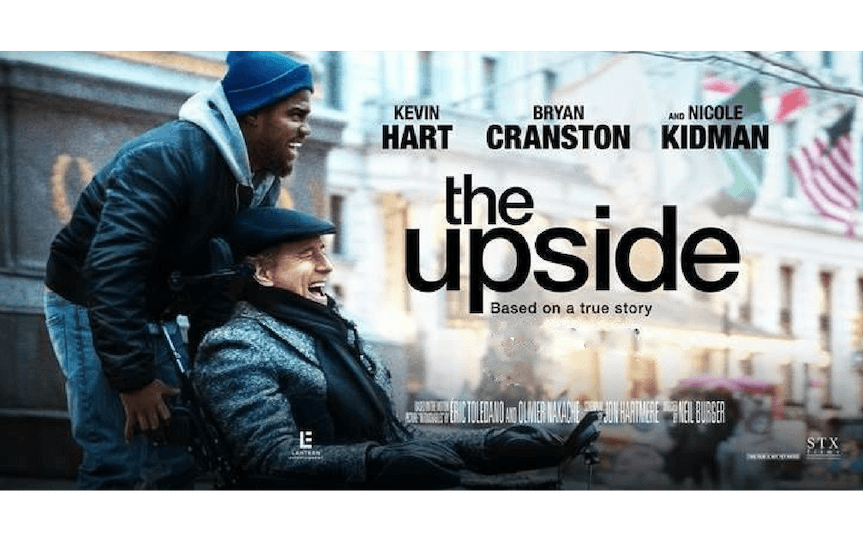For my first Neuro Note, I decided to write about the movie, The Upside. Just recently, we learned about spinal cord injuries in class and I immediately remembered watching this movie a few months ago. It is a fictional movie, but it is based on a true story about a man with quadriplegia. The story touched my heart, and I learned a few lessons from the movie that I can relate back to occupational therapy.
To give a little background of the movie, a man named Phillip, who also happens to be a millionaire, was involved in paragliding crash, obtained a high spinal cord injury, and was completely paralyzed from his neck down. His wife was also in the crash and survived, but died a short time after due to cancer. Fast forward and he is looking for a new life auxiliary to take care of his everyday needs, and an unlikely person comes in for an interview. This man, Dell, was just formerly released from prison and was searching for a job. He was the most unqualified, but Phillip hired him because he was a man who told it like it was and treated Phillip like any other human being. They quickly became great friends and Dell pushed Phillip to find joy in his life again after his wife's death. By the end, Dell even got him to go paragliding again, something that he used to thoroughly enjoy before his accident, by using adaptive equipment. (Dell was giving OT and didn't even realize it!)
This movie put a focus on the holistic approach that we as OTs take towards our clients. Even though Dell was not qualified, or an occupational therapist, he was hired just for the sole fact that he treated Phillip like a regular person, not just as someone with a disability. In the movie, many people that were interviewing for the life auxiliary job talked around Phillip like he wasn't in the room, like he was just a job for them to do, or were very insensitive to his disability by making it the only topic they discussed with him and never got to know who he was as a person. There was also a scene where Dell and Phillip were ordering hot dogs, and the worker asked Dell what Philip wanted to eat. Dell tells the man to ask him himself, making it a point to teach the worker that we all deserve to be treated with respect and fairness. As occupational therapists, we know that a disability does not define who someone is. I thought this movie does a great job of showing how to treat someone as a whole person, and to see who they are on the inside. Because Dell looked at Philip holistically, they built a great friendship, and Philip became more eager to live his life to the fullest and push himself to do the things that he used to love to do before his accident. Dell also took an interest in things that Philip loved, such as art and opera. Even though he didn't particularly like these things, he put his boss/friend first and built on their relationship by doing what Phillip wanted to do. This reminded me how important it is in building our therapeutic relationships as occupational therapists to always put the client first, and also how important is it to get to know them and what they love in life, so we can use those things as motivators to build trust and comfort with the client.
The movie did a good job on showing not just the physical aspect of Phillip's quadriplegia, but also the emotional side of an injury like that can affect someone's everyday life. Quadriplegia, or paralysis of all four limbs, caused Philip to be almost completely dependable on someone to take care of all of his ADL's: feeding, showering, grooming, going to the bathroom, etc. The only things that he could do independently were breath on his own, talk, make decisions for himself, chew to eat, and steer his powered chair with a special joystick using his chin. The movie displayed very well how frustrating this type of disability can be when someone is having to doing everything for you. It also depicted how things such as anger and depression can seep in with an injury this serious. This brings up another take-away that I got from the movie, and that is to always be mindful of the client's feelings and what it must be like to be in their shoes. It was a reminder that occupational therapy is way more than helping someone with their physical needs, but their emotional needs as well. Just because Philip was a millionaire, it would be easy to think that he still has it better than a lot of people, but he admits that money isn't everything. He needed a good support-system to encourage and motivate him after his wife died, and Dell provided that to him.
I really recommend this movie to anyone looking for a feel-good, life-lesson teaching movie. It was a great reminder of how we should be treating our clients holistically as occupational therapists and how to always be empathetic and mindful of everything that is going on in their life, not just their disability.
Citations:
Hart, Kevin, et al., actor.
The Upside. Directed by Neil Burger, Written by Jon Hartmere, produced by Todd
Black, 2019.
Photo:
https://www.google.com/searchbiw=1259&bih=591&tbm=isch&sa=1&ei=bAk1XceTDInatAXF94q AQ&q=the+upside&oq=the+upside&gs_l=img.3..0l2j0i67l3j0j0i67j0j0i67l2.33496.35069..35231...0.0..0.79.701.10......0....1..gws-wiz-img.......35i39.xQ-7jdWoM1A&ved=0ahUKEwjH-Zy4qMfjAhUJLa0KHcW7AhQQ4dUDCAY&uact=5#imgrc=L00iIlV84n67bM:

Comments
Post a Comment